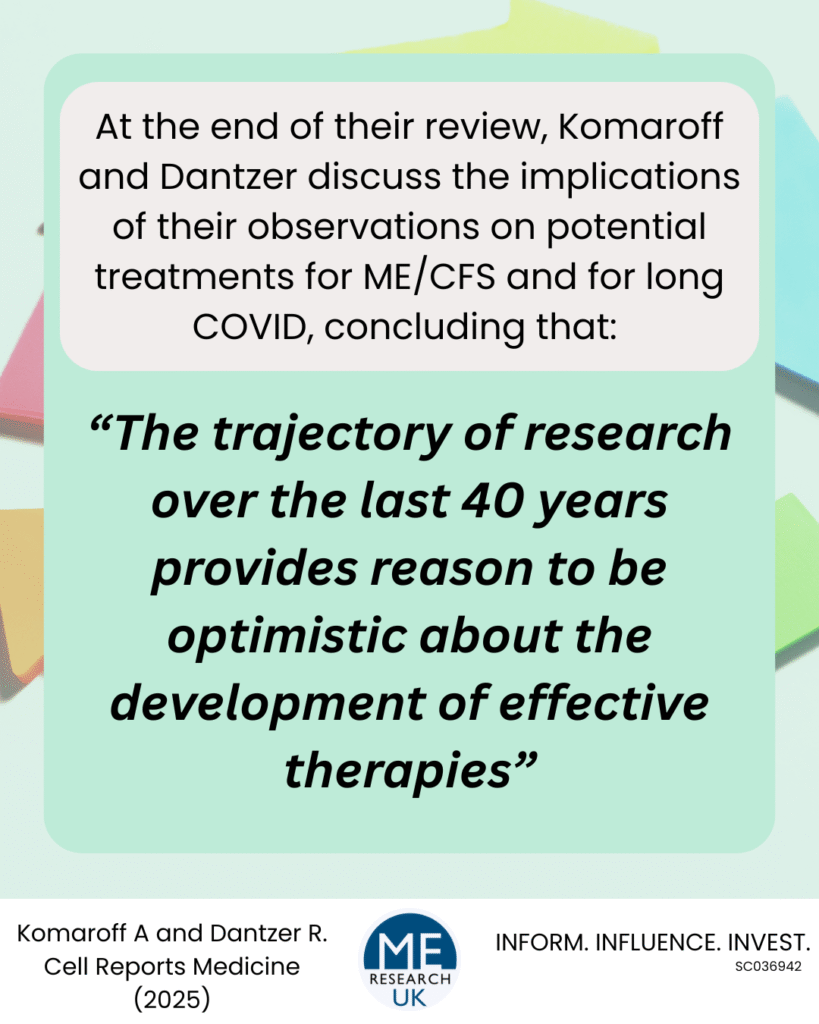A review by Prof. Anthony Komaroff and Prof. Robert Dantzer, published in the journal ‘Cell Reports Medicine’, has highlighted that ME/CFS and long COVID may share common biological abnormalities such as:
- Problems with energy production and utilisation in cells (cell metabolism).
- Issues with the immune system (immune dysregulation).
- Inflammation in the brain (neuroinflammation)
- Disruption of blood flow to the blood-brain barrier leading to cognitive and cardiovascular symptoms.
- An imbalance in the micro-organisms – including bacteria, fungi, and viruses – in the gut, known as gut dysbiosis, that may lead to continued inflammation.
- A state in the body – known as oxidative stress – caused by increased number of potentially harmful molecules known as “free radicals” or “reactive oxygen species” (ROS), which leads to cell damage and disease.
Importantly, the authors identified that these abnormalities can directly cause symptoms of both illnesses, and that several of the underlying abnormalities can reinforce each other and lead to persisting “vicious cycles” of illness and disease. Interestingly, a continuous cycle of dysfunction between the immune system and metabolic dysregulation is also something that was linked to ME/CFS in a review by Jente Van Campenhout who is a PhD student working on research funded by ME Research UK.
The linked abnormalities discussed in the paper by Komaroff and Dantzer included:
- Mitochondrial injury and inflammation: inflammation in the body can cause damage to mitochondria – the structures, found in every cell in the body, which convert energy from our food into a form our cells can use. Mitochondrial injury in turn, can lead to increased inflammation in the body.
- Dysautonomia and inflammation: inflammation in the brain can lead to dysautonomia – where the nerves of the autonomic nervous system responsible for controlling processes in the body that occur without our conscious control, including energy production and heart rate regulation, do not communicate properly leading to symptoms such as dizziness, feeling faint or fainting, and hot flushes. The ANS also helps the body to regulate inflammation, and in a state of dysregulation this process may be impaired leading to increased inflammation in the body – and brain.
- Oxidative stress and endothelial dysfunction: oxidative stress can lead to the aging of cells which line blood vessels (endothelial cells) encouraging chronic endothelial dysfunction. Chronic endothelial dysfunction, in turn, creates oxidative stress.
Komaroff and Dantzer also proposed that the neuroinflammation, caused by some of the biological abnormalities seen in ME/CFS and long COVID, triggers chronic activation of ancient evolutionary responses that aim to help the body to survive challenging circumstances.
At the end of the review, Komaroff and Dantzer discuss the implications of their observations on potential treatments for ME/CFS and for long COVID. In this section, they state that many of the underlying abnormalities discussed in the paper can be targeted with specific therapies. However, there is not yet any evidence that targeting any single abnormality – such as gut dysbiosis or dysautonomia – by itself would successfully treat all symptoms of either illness. Despite this, the researchers conclude by saying:
“The trajectory of research over the last 40 years provides reason to be optimistic about the development of effective therapies”
A more in depth write up of the review by Komaroff and Dantzer by ME Research UK is to follow. In the meantime, it is important to remember that ME/CFS is a symptom-based clinical diagnosis not a mechanistic one. It is clear there is a high degree of shared pathophysiology between ME/CFS and long COVID, and the two diagnostic labels are not mutually exclusive.




